
11 minute read
HEALTH
THE CHANGING FACE OF CANNABIS
THE reputation of the cannabis plant is quickly changing with significant potential as a medicine.
Its new human face is also very different. Elizabeth Plant, with a successful career in pharmacy, is a Chief Medical Officer for Eqalis Pharmaceuticals, a Bay of Plenty company and one of the new emerging medical cannabis pharmaceutical companies. Her career in pharmacy has included President of the New Zealand Pharmaceutical Society, Chief Pharmacist of Taranaki DHB and a consultant pharmacist for organizations such as Corrections, Southern Cross health Insurance and a member of all the national medical safety committees.
“Cannabis is a very complex plant with more than 120 cannabinoid, 200 terpenes (compounds that smell such as limonene), and flavonoids
ELIZABETH PLANT.
(flavours), all these compounds have therapeutic potential” said Elizabeth.
Elizabeth was attracted to the role of chief medical officer because of the enormous potential cannabis presents as a medicine. “As a pharmacist it was an irresistible challenge to develop safe and effective medical formulations for a number of medical conditions” she said.
Medical conditions for which the cannabis plant could hold potential, include treating chronic pain, anxiety, sleep disorders, epilepsy, nausea and vomiting associated with chemotherapy and spascity caused by Multiple Sclerosis or spinal cord damage. “The components of cannabis (THC and CBD) mimic the natural endocannabinoids in our body. These are responsible for keeping the body system in balance. Many current mainstream medicines prescribed today were derived from plants and cannabis presents us with a treasure chest of opportunity for a variety of treatments. However, as with any medicine there are possible drug interactions and adverse effects such as the psychoactive effects of THC (which give you a high). So, it’s very important that any new medicines are formulated to achieve the best outcome for each specific condition being treated. It’s an exciting new field of medicine” says Elizabeth. Eqalis was established in early 2019, with founding shareholders resolved to build an industry, from the ground up, in the horticultural heart of Bay of Plenty. Business Manager of Eqalis, Brendon Ogilvy, said that since the earliest days of this emerging category, tenacity, agility and innovative thinking would be needed to discover and bring the medicinal qualities of the cannabis plant to people. “We are at the very forefront of New Zealand medical cannabis research and it is a fascinating journey of discovery already” says Brendon.
Please consult with your doctor to ensure both access and supply of the Medicinal Cannabis is right for the treatment of your condition.
HEARING LOSS: A COMMON PROBLEM FOR OLDER ADULTS
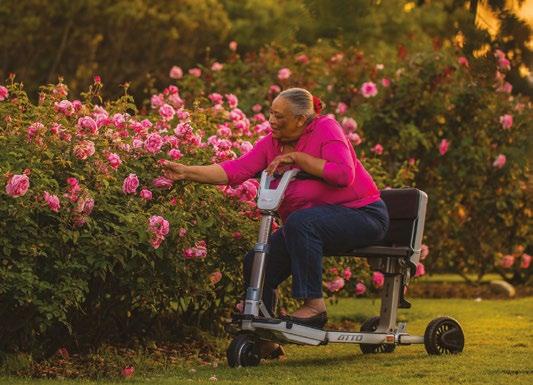
HEARING loss is a common problem caused by noise, and hereditary. People with hearing loss may find it hard to have conversations with friends and family. They may also have trouble understanding a doctor’s advice, responding to warnings and hearing doorbells and alarms.
Approximately one in three people between the ages of 65 and 74 has hearing loss and nearly half of those older than 75 has difficulty in hearing. But people don’t want to admit they have trouble hearing. Older people who can’t hear well may become depressed, or even withdraw from others because they feel frustrated and embarrassed about not understanding what is being said. Sometimes older people are mistakenly thought to be confused, unresponsive or uncooperative because they don’t hear well.
Hearing problems that are ignored or untreated can get worse, if you do have a hearing problem please do see your doctor. Hearing aids, special training, certain medicines and surgery are some of the treatments that can help.
In studies of hearing loss; older adults may have a greater risk of developing dementia than adults with normal hearing. Cognitive abilities (including memory and concentration) decline faster in older adults with hearing loss than in older adults with normal hearing. Treating hearing problems may be important to cognitive health.
If you have hearing problems you should: • Let people know you have a hearing problem • Ask people to face you and to speak more slowly and clearly and to speak louder without shouting • Pay attention to what is being said and to facial expressions and gestures. • Let the person know if you do not understand what he or she has said • Ask the person speaking to reword the sentence and try again • Find a good location to listen.
Place yourself between the speaker and the sources of noise or look for a quitter place to talk.
The most important thing you can do if you think you have a hearing problem is to seek professional advice.

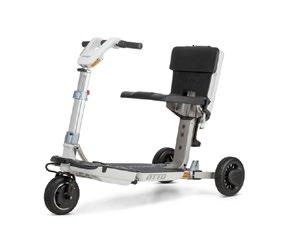
DID YOU KNOW THAT MANAGING HEARING LOSS MAY HELP PROTECT AGAINST DEMENTIA?
50 MILLION people worldwide have dementia and according to a 2019 study(1), 50% of people believe they are unable to reduce the risk of dementia.(2)
A new report shows a surprising link between hearing loss and dementia.(3) It is thought that if you have difficulty hearing, there’s a chance that this may cause reduced cognitive stimulation, which may be associated with cognitive decline. Do you have difficulty with background noise in busy restaurants? You might be suffering from hearing loss without even realising. Audika recommends maintaining an active hearing lifestyle and booking in annual hearing checks to help maintain an overall higher quality of life in your later years.
If you or a loved one are struggling with hearing, reach out to us and speak to a qualified Audika hearing expert today.
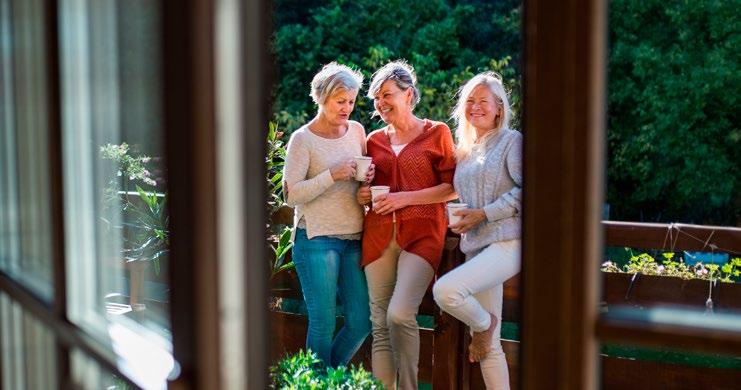
Visit audika.co.nz or call 0800 47 50 04 to find out more and book a free(4) hearing
check today.
REFERENCES AND TERMS AND CONDITIONS 1. HTTPS://WWW.WHO.INT/NEWS-ROOM/FACT-SHEETS/DETTAIL/DEMENTIA 2. BSA SURVEY, 2019, HTTPS://WWW.NCBI.NLM.NIH.GOV/PMC/ARTICLES/PMC6545627/ 3. G LIVINGSTON, JONATHAN HUNTLEY, ANDREW SOMMERLAD, ET AL. DEMENTIA PREVENTION, INTERVENTION, AND CARE: 2020
REPORT OF THE LANCET COMMISSION. THE LANCET. JULY 30, 2020. 4. FREE HEARING CHECK AVAILABLE TO PEOPLE 18 YEARS OR OVER, EXCLUDES GP/ENT REFERRALS.

GENEROUS SERVINGS OF EVERYTHING FOR SUMMER ON THE COAST WITH THE MOST
By Chris Birt

LAKE BRUNNER IS THE LARGEST LAKE IN THE NORTHWESTERN SOUTH ISLAND OF NEW ZEALAND, COVERING AN AREA OF 40 KM². Think of a smorgasbord and the mind automatically defaults to cuisine and more often than not tables overflowing with gastronomical delights.
But while this may be the accepted meaning, there are other connotations and one region in particular has made an art form of putting serving up much more on its plate.
LEFT: STATIONS INN HOKITIKA CENTRE: HOKITIKA GORGE BELOW: BAZILS HOSTEL CAFE
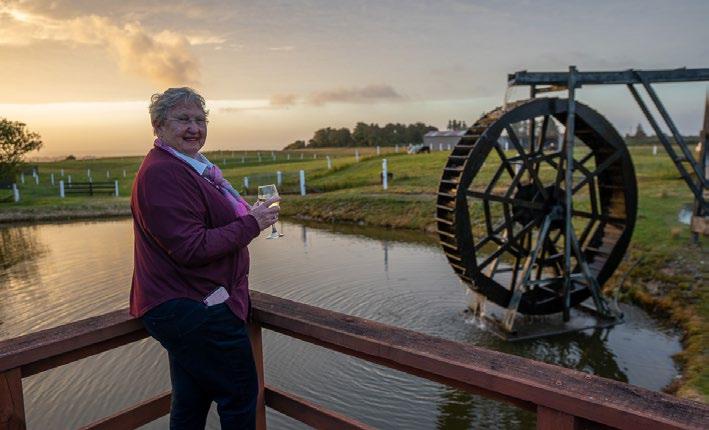
Food, of course, plays a significant role amid the Untamed Natural Wilderness of the West Coast. Fresh is best and this region has a reputation for the quality of its seafood and diverse range of produce, all lovingly crafted into culinary works of art by chefs who are passionate about preparation and presentation.
Add to that the other essentials of life, such as the home-grown ales and wines, and a visit to the West Coast becomes a smorgasbord in every sense of the word.
This is a region that many Kiwis have thought about visiting, but haven’t quite got there. In the absence of the thousands of international travellers who pour into this long sliver of wooded land each summer, now is definitely the time to head out West.
Remote it may be, but inaccessible it is not. The West Coast is well serviced by road, air and rail transport and getting there from the Top of the South, from Canterbury to the east or from Queenstown and Wanaka at the southern end is infinitely do-able. Access from each direction has its own attraction.
To make things easy for trip planning the hospitable locals have divided this 600-kilometre long region into a number of defined areas, each its own selection of things to see and do.
The West Coast is an ideal destination for Seniors, with a hefty list of natural wonders, history and heritage sites and wide assortment of accommodation offerings, each suited to meet individual budgets.
The thing with this region is that visitors can be assured of the opportunity to be as active - and equally as passive - as they want to be. Mixing and matching is a great option, with choice of activity coming down to one’s personal interests and desires, or a change in mood from one day to the next if that’s a motivating factor.
The region’s three stunning cycling trails, which are also suited to walking, are a prime example. The Old Ghost Road and newlyopened Paparoa Trail provide an opportunity for die-hard mountainbiking enthusiasts to undertake multi-day expeditions amid some of the most remote and spectacular backcountry scenery anywhere on the planet.
By contrast, the West Coast Wilderness Trail provides a much more benign experience, much of it along the rugged coastline and is ideally suited to Seniors to whom the seat of a bike is now only a distant memory.
One of its key features is its smooth surface designed with the silver brigade in mind. Add in surging rivers, moody lakes, tall trees in lush rainforest, some of the cheekiest creatures one will ever experience and this is a trail suited to all. It’s best planned as part of an overall experience and best executed over three or four days.
A visit to the West Coast isn’t something that deserves to be left sitting on a bucket list. Real deals are currently on offer from one end of this stunning region to the other and summer is an ideal time to grasp the nettle, be it for an extended stay or through a series of mini-breaks.
It’s unequivocal. The West Coast promises Active Seniors the chance to reconnect - with some of the most hospitable and friendly people on the planet, with each other and with the things that are really important for bodies and souls.
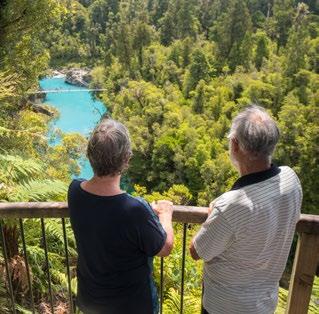

WILL SUPER BE ENOUGH TO FUND YOUR DREAM LIFESTYLE?
MANY assume that by the time you hit retirement, you will have enough savings to fund the lifestyle you’ve always desired. However, with the rise in living costs and an aging population, this is unfortunately not the case for many Kiwis.
Recent research from the Financial Services Council found that superannuation is not enough to fund most New Zealanders’ standard of living in retirement – especially those in urban areas who want a larger amount of financial flexibility for their active lifestyle.
More and more Kiwis are looking to solutions like a reverse mortgage to help them fund their dream retirement.
What is a reverse mortgage? A reverse mortgage is similar to a home loan, but it designed specifically for those that are 60 and over, with no regular repayments. It allows you to unlock some of the equity in your home without having to sell it. These funds can then be used for almost anything, and are often put towards: • home improvements • traveling around New Zealand • assisting family • consolidating debt • covering medical and healthcare costs • purchasing a new car • day-to-day living expenses, and more
Heartland is New Zealand’s leading provider of reverse mortgages, having been awarded Consumer Trusted Accreditation for four years in a row. We’ve helped more than 17,000 Kiwis fund their ideal retirement lifestyle without having to leave their home or make regular repayments.
But don’t take our word for it – here’s what our customers say:
“Simply put, we wouldn’t have been able to do what we’ve done without the mortgage. It’s really given us a new lease on life…and importantly, it’s allowed us to keep our home.” – Sarah

“I went paragliding for the first time on my 80th birthday and loved it. I’m so glad I could use my biggest asset to ensure that life is as enjoyable as it can be!” – Jan
“At no point did we feel pressured into rushing into the decision. Everything was thoroughly explained to us and Heartland was completely transparent.” – Peter
To be eligible for a Heartland Reverse Mortgage, you need to be over the age of 60, own your own home outright, or have a home loan that can be paid off by the reverse mortgage. The amount you can access depends on your age and the value of your home.
If you’re keen to learn more about how a Heartland Reverse Mortgage could help you fund the retirement lifestyle of your dreams, call us today at 0800 488 740 or visit our website www.heartland.co.nz/ reverse-mortgage *HEARTLAND BANK’S LENDING CRITERIA, T&CS APPLY.





